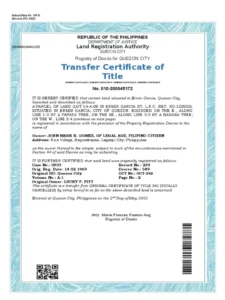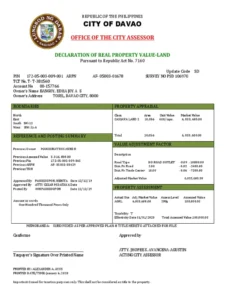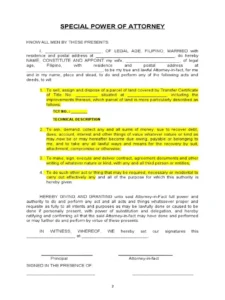You’ve found the perfect piece of ground to build on and now it’s time for you to do due diligence on the ground. What you are about to discover is that in the Philippines. finding a great piece of ground is about as difficult as falling off a log. Finding a great piece that has all the required paperwork, not so simple.
A Definitive List of Required Documents
The list below includes every document you may or may not be requested to present when attempting to transfer a lot or home into your spouses name. Some of these documents also bear relevance to rentals and leases, and where this is the case, it is noted in the expanded sections. In almost every instance original documents are required or copies that have been duly certified. If you are unable to obtain any of the documents listed below, we strongly urge caution. Never pay out any money until the seller produces all the original documentation.
- An official Land Registry Title called Transfer Certificate of Title (TCT) or for condominiums a CCT (all pages)
- Certified True Copy of Tax Declaration (Land)
- Certified True Copy of Tax Declaration (Improvements)
- Tax Clearance for Current Year
- Deed of Sale (if available)
- Sellers (all of them) Birth Certificate(s)
- Letters from each owner acknowledging the Sale (not a requirement for transfer, but it ensures the process cannot be derailed)
- Death Certificates (where applicable)
- Special Power of Attorney (if any Seller is abroad)
- A Geodetic survey of the lot (unless previously surveyed)
- Homeowners Association (HOA) clearance in the case of developments
- Certified copies of government issued ID for all sellers
Titles (TCT or CCT)

Certified True Copy of Tax Declaration and Tax Clearance

You will require a recent receipt from the local tax office to ensure the property taxes are up to date. These documents vary from council to council but must identify the property as the one you are interested in, and clearly indicate the current balance (if any) due in terms of property taxes. Agricultural or farming ground enjoys far lower rates of tax in comparison to commercial/residential ground. If there are overdue taxes on the ground, insist the seller settle these prior to the sale or be prepared to fork out money for this on the sellers behalf. Perhaps discuss reducing the price of the ground to cover any shortfalls.
Deed of Sale
While not essential, the seller, if they have a clean title for the property they are selling, should have copies of their original deed of sale, outlining the terms and conditions under which they purchased the land. This helps with due diligence and establishing a clear line of ownership.Always check these documents to ensure all parties mentioned in the sale agreement have signed, including the attorney who prepared the document.
A note on SPA’s

A Special Power of Attorney is issued to someone to act on behalf of another person. For example, if the seller lives in Canada, he will issue an SPA to a family member to act on his behalf executing legal documents. While this sounds straightforward, SPA’s are one of the main reasons for post-sale litigation. In most instances unscrupulous family members will obtain an SPA under false pretenses from the real owner, using it to literally sell the land out from under them. If you want to avoid being embroiled in a long and costly legal battle, make sure you have direct contact with the seller and keep copies of all correspondence (preferably email) that confirm the legal owners intent to sell at an agreed price.
This can become a real issue where multiple owners are listed on the title (usually siblings) and one or more of the listed individuals do not want to sell the parcel of land. To complete the sale, SPA’s are obtained under false pretences from the parties blocking the sale and used to conclude the transaction. Needless to say, you’ll be the one left holding the mess and as the new “owner” be the target for any aggrieved parties seeking legal retribution.
A more elegant solution is to ensure the SPA contains all the details of the proposed transaction, see the image above, and is not simply a broad reaching SPA that gives general authority to execute legal documents.
Other Non-paperwork issues you need to consider
Tenants
If you’re buying a larger tract of land, it could potentially be rice field, agricultural ground or simply a larger than normal residential lot. For agricultural (including rice fields) if the ground is actively being farmed by someone other than the legal owner, you could be facing issues with a tenant, who may, depending on the length of time they have been using the ground, have developed certain legal rights or claims against the land.
Proceed with caution and always consult directly with the tenant. Do not accept assurances from the land owner with regards to the tenants status. Although your sale may still conclude you might find yourself having to honor the tenants acquired legal rights, in short, losing a portion or more of the ground you have purchased. Sellers are aware of tenant issues and will always look to pass these on to the buyer to resolve. Either way, it can end up costing you ground, money or both.
If there are informal dwellings or houses on the ground that are occupied by people other than the seller, don’t even get involved with the land, no matter how tempting a deal may appear.
Elevation
Mountain sides, large flat areas (typically in cities) and low ground. Three places you don’t want to consider for building. Building at the base of or on the side of a mountain or small hill exposes you to landslides, a common occurrence here, particularly where the mountain slopes have been farmed aggressively and the natural vegetation has been removed in favor of coconut trees, bananas and other crops.
Small towns and smaller cities suffer from poor urban planning and will often flood really badly during heavy rainfall, where water can rise by a meter or more and inundate your home, so check the area properly and talk to neighbors about flooding. Ofcourse, any area of low ground will be subject to flooding, particularly if there are rivers in close proximity. Most rice fields benefit from canal systems to irrigate the crops and these can also flood aggressively during typhoons.
Positioning
Does the lot layout allow you to construct a house that can have its main windows turned away from the angle of sunrise and sunset? What may sound silly, is in fact of huge consequence to your electrical bill and the indoor temperature in your home throughout the day. Align your windows with the suns trajectory and you will live to regret it.
Access
If the land does not have its own access to a government laid road, ensure you have legally binding access, don’t take it for granted that the persons between you and the main road will afford you access. Confirm right of access with your neighbors directly to ensure there is no room left for argument after the fact.